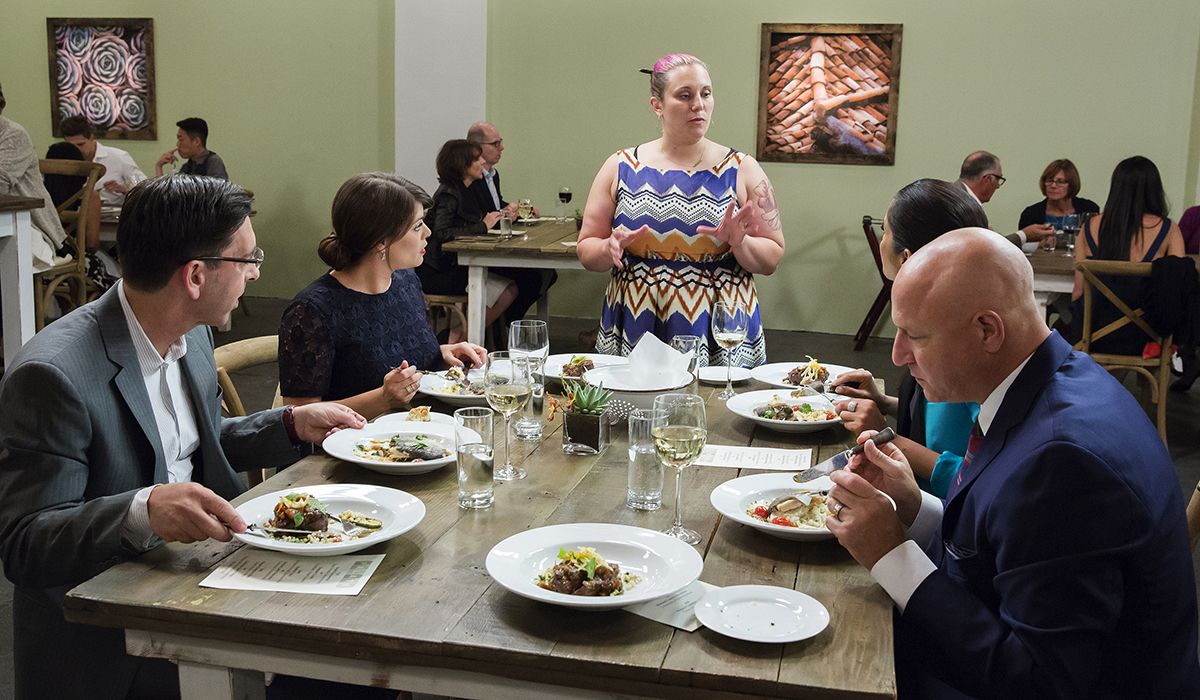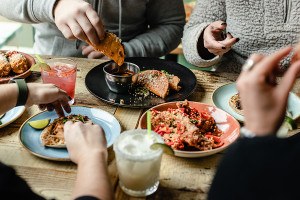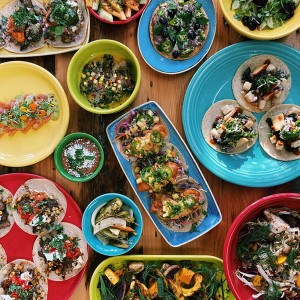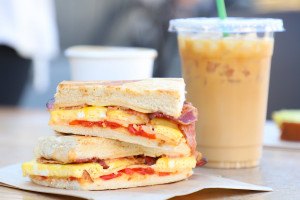Top Chef Recap: Restaurant Victory

Karen Akunowicz serves (L TO R) guest judge Bill Chait, Gail Simmons, Padma Lakshmi, and Tom Colicchio at Palate. / Photo by Dale Berman / Bravo
With a stacked cast of competitors and Top Chef’s first-ever road trip season, it should surprise no one that the pivotal challenge, Restaurant Wars, would also be over-the-top in season 13.
For the first time ever, the remaining eight chefs had to not only open a restaurant in 24 hours, they also had to serve both lunch and dinner. Restaurant Wars spanned two episodes.
They drew knives, and Karen assembled her team: Marjorie, Carl, and Isaac. They conceptualized Palate, a restaurant showcasing refined flavors and California ingredients.
The Bravo producers had us believe the dream team might have leadership issues—Isaac makes several suggestions which appear completely ignored. But it soon became clear the “good lady juju” and overall coalition of Team Palate set it up for success. While the bros opening District LA took a “not my dish, not my problem” approach to their menu, Karen and Carl co-created a risky yet ultimately rewarding tortellini en brodo, and both exhibited poise as front-of-house manager and executive chef, respectively, during dinner; triple threat Marjorie slayed front-of-house during lunch, and bread and dessert courses during dinner; and Isaac made the judges’ favorite dishes of the challenge and was a team player.
Palate’s potential outsider, Isaac, ultimately took the challenge, but “once Padma announced we had won, none of us cared who would get the individual win,” Carl says.
KAREN AKUNOWICZ
Congratulations on surviving Restaurant Wars!
Thank you! It was crazy. I also feel that it went remarkably well. I can’t say enough about Team Palate—Carl, Marjorie, and Isaac. It was funny watching it, everyone was like, ‘Wow, you guys are calm, the kitchen looks calm, the dining room looks awesome.’ It definitely didn’t feel that way inside, but it felt good.
Tell me about how you picked your team.
Amar had first pick. Of course, you would like first pick, but I got exactly the team I would have chosen. I would have loved to have any of those guys on my team. But getting to pick to pick Marjorie first was really lucky, and also a strategically a really smart move. She and I can communicate without having to talk too much. Our cooking styles are similar enough that we get what the other is trying to do, and also she is so strong in baking and dessert, and she was really the only one of us who was strong in those categories. So that Amar didn’t pick her first, I was very surprised.
Carl and I have worked well together now on two other team challenges. When Amar made that last choice to choose Phillip over Isaac, I was surprised and overjoyed.
I know they play up the drama on TV, but it seemed like Isaac felt slighted to be chosen last.
I know it was tough on him to be chosen last. He made a reference to kickball, which I completely get. But there’s only eight of us left. It wasn’t like, ‘I don’t want that person.’ It was really about trying to be strategic with your choices. He could have gone to either team and been strong.
I was really looking at it like building and creating a new restaurant, and they mentioned to us at the Judges’ Table that we really treated it like we were opening a real restaurant: When you do that, you’re looking for people who can collaborate together, people who have core similarities and then different strengths. I felt like that was how our team was represented.
People have maybe not even an hour for lunch. What do they want to eat, and how do we get them in and out the door? The judges saw that, and I think they appreciated we looked at it as realistically as possible.
They didn’t really show that feedback.
Even though it was broken up into two episodes, there was so much more! I woke up the morning of Restaurant Wars with a stomach flu. You look at me cooking at lunch, and I’m green, and not my usual enthusiastic self. It was intense. More than anything, for me, I was like, you cannot let Carl and Marjorie and Isaac down.
That’s amazing. Going back a little, were you really ignoring Isaac’s ideas as much as it was portrayed?
One of the great things about Isaac is he’s a machine. Everyone who watches the show is like, ‘He can’t be really like that, right?’ No, that’s exactly how he is all of the time. As good brainstorming sessions go, you have 100 ideas, you’re going to throw out 91 of them. I think there was less of us not listening to Isaac. For each one of us, only one or two of our ideas made it on the menu.
What was the most stressful aspect of Restaurant Wars?
The whole thing? [laughter] I took on a dish for lunch and a dish and a half for dinner, and we knew I’m going to have to leave [the kitchen]. Marjorie started off [the staff] off for me, but someone else had to finish and plate your food for you. You saw Isaac do that. Something people talk a lot about in Restaurant Wars is that when you’re front-of-house, you have to leave my food in the hands of someone else. I was never worried about that. It was stepping out of cooking two dishes and prep mode, throwing up, then physically changing into a dress and lose that last bit of prep time. That was stressful.
It seemed to go well, though.
I was really proud of the work I did in the front-of-house. I wanted people to feel warm and welcome. One of the biggest compliments I got was from Padma and Tom, who said I made sure the diners felt like they were the most important thing in the room. Not me, not the chefs. I was able to make the judges and the rest of the diners feel that this was about them. That’s what every restaurant is about. We have a saying at Myers + Chang that comes from Christopher Myers: Hospitality is not a hat. You don’t come to work with your hospitable hat on. It’s something you embody in your everyday life: You stop on the street to give someone directions, you’re as hospitable to your coworkerss as you are to your guests. That was my mantra.
I was super proud of the food we made, too. I know they loved my steak salad at lunch; that was a strong contribution. But I loved that Carl and I collaborated on a dish. His consomme with tripe and oxtail was one of the best things I’ve ever eaten. His skillset and his talent really came through on that. Making pasta is one of my passions, and to combine our passions to make a dish that was really stunning, I almost think it’s a metaphor for our team: We were able to take our strength and bring them together in a beautiful way.
Is there a future for Palate?
Carl and I talk all the time about a tortellini en brodo pop-up, or a tortellini en brodo cart. You never know. That’s my dream!
CARL DOOLEY
Congrats on surviving and thriving.
We crushed it!
Did you really think it was “awesome” that you were the first group to be charged with lunch and dinner service?
Yeah! It was a great challenge. Usually by the time they have eight left, there are some people you scratch your head at. But this group is really strong. I thought it was appropriate they threw in lunch and dinner service. We were all fired up about it.
After lunch, the judges told everyone that the whole service was too safe. Of course, you already had dinner planned. You had planned to up the ante, but how did you approach lunch and dinner differently?
We approached them the same way: We really wanted to provide an awesome restaurant experience. Some of the dishes we could have done better, but we really nailed the service. We knew it was important to give ourselves enough time to set ourselves up to provide a more refined dinner experience. We used our time well. We kept looking around during lunch and dinner, like when are we going to get crushed? But we nailed both services.
When the teams were picked, we were really excited about our team. On paper, the other team had more wins going into the challenge. But we thought we had a stronger team that would work better together, and ultimately we had each others’ backs. Everyone was working as a finely-tuned restaurant, and everyone played a huge role.
When you were the executive chef during dinner, Isaac said you were “about as erratic as a caffeinated squirrel, which is good in this situation.” What did he mean?
It certainly wasn’t erratic; it was high-energy. [As executive chef,] You have to set the tone and push the pace. Expediting is something I’m strong at. I talk a lot, and I require a lot of communication from my cooks, and that’s exactly what we did. Everyone knew exactly what they had to do, and it made for a really strong service. Having expedited many Saturday night services at Craigie on Main, that was pretty easy. [laughter]
Everyone was able to bring their own style, but the menu ate really cohesively and we did a good job executing. Plus, Marjorie made awesome bread, a cheese course, and dessert; it was really a full meal, rather than throwing out a bunch of individual dishes.
What was the most stressful aspect of Restaurant Wars?
The most stressful part was the night before, just getting things set up. I took a leadership role in setting up the kitchen, how we were going to organize the flow of service. Physically, the way we set up our kitchen was better than the [other] team. We had it in a way that we could all help each other plate really easily, so it wasn’t just one person cooking on a station.
I thought any of us could have-slash-should have won that challenge. It was great to see Isaac get the win, but if any of us won, we wouldn’t be surprised.
But of course, I should have won. [laughter] I think I was the first person on Top Chef to cook tripe ever, so that was awesome. It’s funky, awesome, and something I love to work with. I really love making old-school consumme, and this was a challenge where we had time to show off how to cook really cool organ meat.
The whole thing about Tom saying there was another crudo is completely ridiculous. What if he rolled his eyes for another chicken dish, or another cooked entree, another pasta dish? It’s a whole genre of dishes. What tasting menu do you have now that doesn’t have a raw fish dish on it? His menus at Craft have it. I was surprised he made a big deal of that.
It didn’t really matter; we crushed it.


